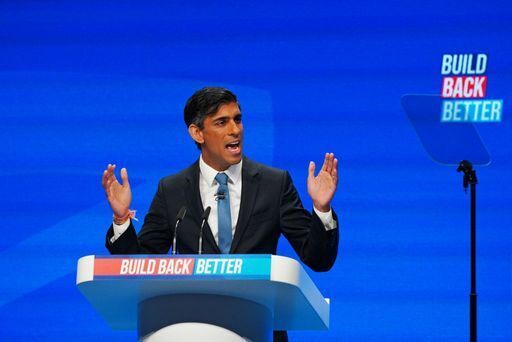In his keynote speech at the Conservative party’s annual conference in Manchester this afternoon, Chancellor Rishi Sunak defended the government’s tax rise, said Brexit was in the UK’s long-term interests, and announced an artificial intelligence scholarship scheme.
He began with the line “Whatever it takes …” saying this phrase was what defined his introduction to his role as chancellor.
He expressed how he had enjoyed meeting people in person at his first conference since being made chancellor, and joked about people commenting that he is ‘even shorter in real life’.
Defending the decision to raise National Insurance contributions, rather than increase borrowing, to fund health and social care, he said he was a “pragmatist” but that he considers excessive borrowing ‘immoral’ and amounts to “stacking up bills for future generations to pay”.


In their 2019 manifesto the Conservatives pledged not to increase income tax, but last month MPs approved government plans to raise NI by 1.25 percentage points.
He said he would only cut tax once public finances had reached a “sustainable footing”, arguing that Labour has lost recent elections because the “British people won’t trust a party that isn’t serious with their money”.
He said increasing benefits was not the answer to young people’s “hopes and dreams”, adding: “Is the answer to tell that young family the economic system is rigged against you and the only way you stand a chance is to lean ever more on the state?”
He said this was Labour’s approach, and that focusing on “good work, better skills and higher wages” is more sensible, arguing that Labour has continued to lose recent elections because the “British people won’t trust a party that isn’t serious with their money”.
He announced 2000 artificial intelligence scholarships for disadvantaged young people, with the aim of doubling the number of Turing AI World-Leading Research Fellows.
This morning he trailed the announcement to extend cash incentives for hiring new apprentices as well as the flagship Kickstart scheme which he praised within the speech.
The scheme provides funding to create new jobs for 16 to 24 year olds on Universal Credit who are at risk of long term unemployment.
He described how his time working in finance and technology in California inspired him as he saw a culture that rewarded hard work.
He said he “put my principles first” when choosing to support Brexit, arguing that “despite the challenges” the UK’s exit from the European Union was in its long term interest, and would help increase its “flexibility” to advance its economy and a “culture of enterprise.”
He concluded the brief speech by saying: “So at just the moment it feels like we’ve done enough, that we’ve gotten through, that we can take a rest, we must not stop. Now is the time to show that our plan will deliver. And now is the time to finally turn to the future.”
Responding to the Chancellor’s remarks, Helen Barnard, deputy director of the Joseph Rowntree Foundation, said:
“The Chancellor may say he has a plan for jobs but he has no plan for paying the bills. He spoke of doing whatever it takes to protect people’s livelihoods, yet he is cutting the incomes of around 5.5 million families by £1,040 a year on Wednesday when we are facing a cost of living crisis.
“It is completely wrong to suggest there is a trade-off between good jobs and adequate social security when they are both essential to improving people’s living standards. This cut will impact many working families and inadequate social security makes it harder for people to seize opportunities whilst they struggle to stay afloat. We must ensure people who are sick, disabled or caring for others and therefore unable to work can meet their needs with dignity.
“To impose the biggest ever overnight cut to social security would be economically irresponsible which is why it is so fiercely opposed from across the political spectrum. The Government can’t credibly claim to be levelling up while levelling down people’s incomes. He must abandon this cut.”
Mark Littlewood, director general at free market think tank the Institute of Economic Affairs also criticised the Chancellor’s speech, saying: “It’s disappointing to hear the Chancellor not only rule out short-term tax cuts but also refuse to rule out further tax rises.
“If the government wishes to be judged by job creation, continuing to tax businesses and entrepreneurs at a near-record level will have the reverse effect.
“While it may be politically popular in the very short-term to extend job support and apprentice subsidy schemes, in the long term they fail to produce net increases in jobs – and at considerable cost to the taxpayer.
“The Chancellor purports to have free market principles, but his actual policy announcements indicate an enthusiasm for state interventionism.”









